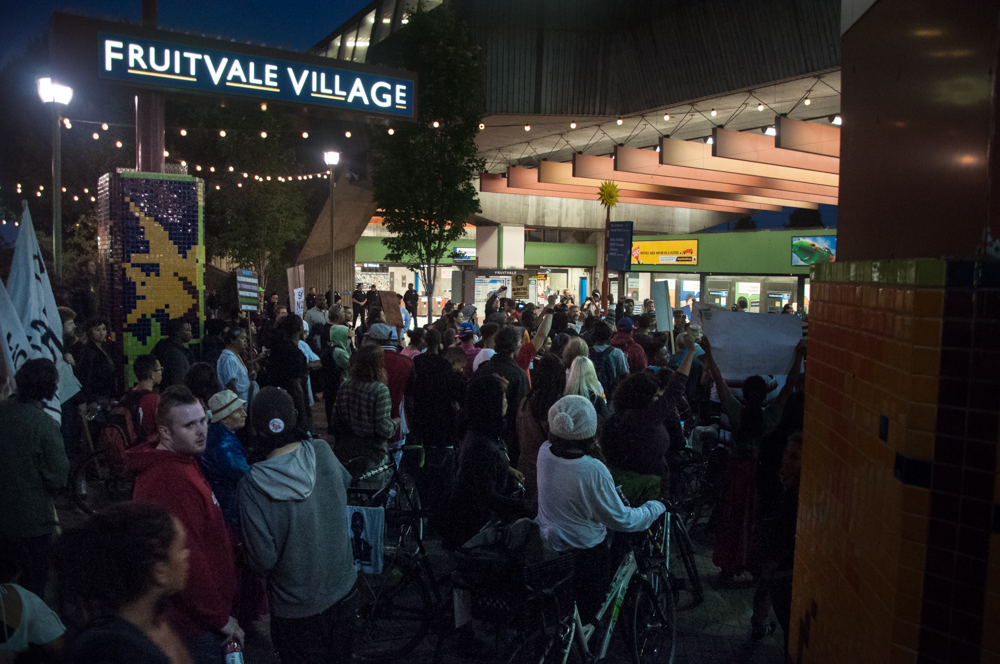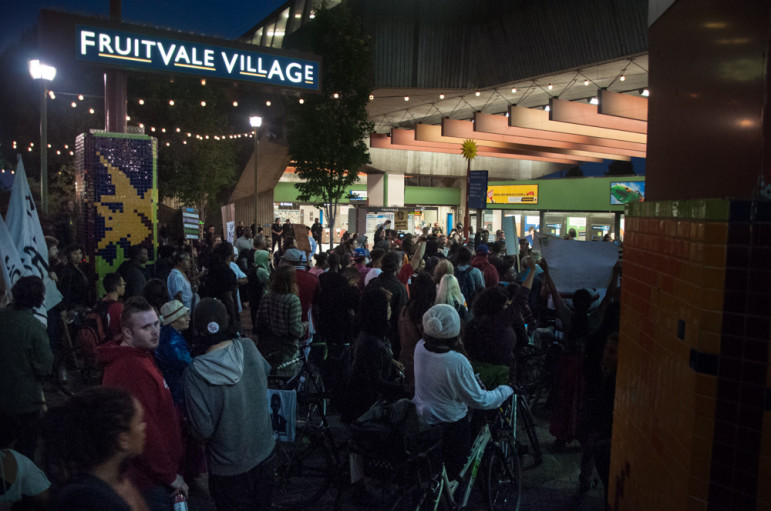
Katy McCarthy / JJIE
Protestors converge on the Fruitvale BART station, also known as Oscar Grant station, unofficially renamed in remembrance of the unarmed 22-year-old who was shot and killed there on New Year’s Day in 2009.
OAKLAND, Calif.--Two helicopters make loops over the marchers, acting as a sort of homing beacon for the curious and those wishing to join the protests. Around 8:25, as the sky darkens, at least 100 marchers appear in the middle of Fruitvale Avenue. They are en route to the Fruitvale BART Station, also known as Oscar Grant station, unofficially renamed in remembrance of the unarmed 22-year-old who was shot and killed there on New Year’s Day in 2009. After a lull nationally in the protests erupting in the aftermath of the George Zimmerman verdict, things seem only to be heating up in Oakland, where people are still unhappy and ready to march and protest for change.
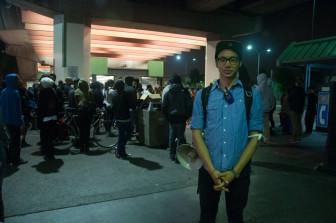
Katy McCarthy / JJIE
Gaston Lau, a 23-year-old organizer who has lived in the Bay Area his whole life.
Gaston Lau, a 23-year-old organizer who has lived in the Bay Area his whole life says, “It’s the symbolic Fruitvale station. I guess most people here are aware of this history. We have to keep making those connections. ... I think the more we make, the better. Let’s blow this up nationally.”
The marching crowd is as diverse as Oakland—grungy kids on bikes, young black men with megaphones, and Latino families. Several of the protesters wear black and white keffiyeh scarves tied over their heads, mouths and noses, obscuring their identities. There are scores of cops--cops on motorcycles, cops in vans, cops in golf carts emblazoned with “Oakland PD.” The marchers’ chants range from “No justice, no peace, fuck the police!” to “Whose streets? Our streets!” to “The whole system is guilty!” There are no windows broken, no bottles thrown.
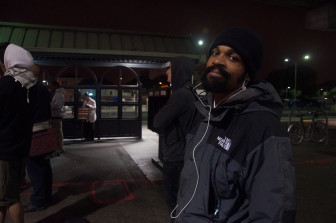
Katy McCarthy / JJIE
Maurice, an Oaklander who has been the victim of police abuse.
Maurice, with his ear buds draped over his ears, says, “I’m here to support because I’ve been a victim of this police crime. There are many different stages, not just shooting, just overusing their badge. They think they are above everybody just because they are wearing a badge. They are here to protect us and serve us but then they’re against us.”
The crowd turns off the street into Fruitvale village, a successful housing project built in 1999 on old BART parking lots. The glass-fronted retail shops on the ground floor underneath the apartments are guarded by a stern-faced Oakland police officer. When asked for permission to take his photo, he replies, “I don’t care.” A man with a hand drum walks up and says it isn’t necessary to ask permission, that photographers can take his picture any time they want to, including photographing his “man parts, even his pig parts.”
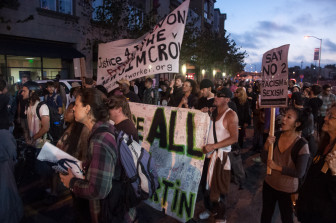
Katy McCarthy / JJIE
Protestors making their way towards Fruitvale BART station in Oakland.
The crowd converges at the entrance to the BART station. Using the human microphone method popular with the Occupy Movement, a woman in charge circles everyone up around an impromptu altar—a sarong on the cement upon which are arranged flowers, bones, flecks of grains, feathers, horns, candles, geodes and wooden talismans.
“I came because I feel like all week I’ve been feeling really overwhelmed with sadness and anger and a lot of different emotions and it felt like I couldn’t just stay home,” Jaclyn, a young woman standing near the back, says. “I wanted to come and do something, so this felt like the best place to come and be. I feel like it was powerful to be around a lot of people who are expressing and feeling different emotions and also try and really make a movement that’s going to go somewhere in the future and make some changes.”
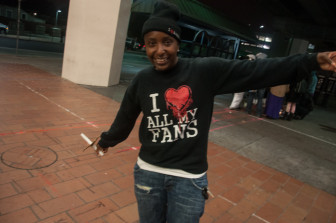
Katy McCarthy / JJIE
Young Shorty Doo Wop
Young Shorty Doo Wop agrees. “We need to have more of these,” she says. “If everybody took a stand, if everybody marched, if everybody signed petitions, really just fought like back in the day, when everybody was marching to Montgomery.” She feels that change is coming, she says, although she doesn’t know when. However, “it should come soon, as long as we put our minds to it, and keep our minds clear and stay in prayer. I think things will change.”
The mood on the street was aggressive and rich with frustration and anger. But at the BART station everything softens. Although the death of Oscar Grant was more than three years ago, people remember it well. Between the acquittal of Zimmerman and the premier of the movie “Fruitvale Station”--inspired by Grant’s death --it has been a tough week for many Oaklanders.
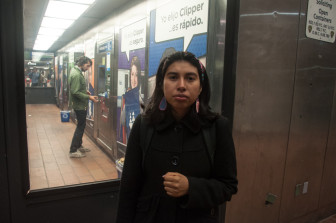
Katy McCarthy / JJIE
Kitzia Esteva, a community organizer, at the Fruitvale BART station after the protest.
Kitzia Estevia, another organizer, says she is here tonight because she is tired of her brothers “fighting for their lives and dying--dying in the streets, dying in the prisons, dying everywhere.”
She adds, “I think today was a really great space both to raise our voices against the slow and fast death of our people and also just to find some space to have people believe in each other and honor the people that have fallen and encourage our commitment to continue fighting.”
Around the altar, spiritual leaders from the community sing and preach. They lead people in calling out the names of those they have lost. It is surprising how many voices ring out with names. People are crying. The circle grows smaller. When people finish listing off the loved ones they have lost, they shout out the names of human rights leaders and freedom fighters that have died. Some of the younger, angrier folks have dispersed; perhaps this was not the rowdy riot they imagined it to be.
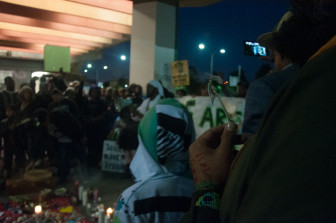
Katy McCarthy / JJIE
Protesters circle up around an impromptu alter at the Fruitvale BART station, many burning sage and incense.
While the message sometimes falters, the consensus among the speakers is the importance of expression and, as one preacher says, the necessity of “maintaining our vulnerability.” And, for most, that seems to be true. As the lingering crowd walks away, the mood is calm, like after a good cry.
Katy McCarthy is an artist, writer and photographer based in Oakland, California.
